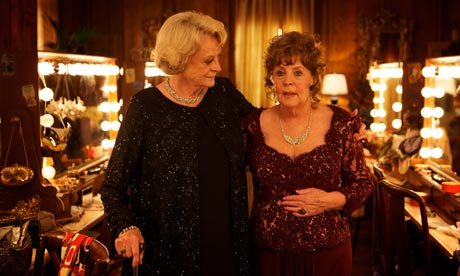
Dustin Hoffman was 30 when he made his screen debut as the 21-year-old Benjamin Braddock in The Graduate. Three years later, in 1970, he played the 121-year-old frontiersman Jack Crabb in Arthur Penn's western Little Big Man. In his 50s he returned to star as Willy Loman and Shylock. So he knows something about the vagaries of ageing. It seems therefore not inappropriate that he makes his confident directorial debut at 75, directing a formidable ensemble cast ranging in age from the 31-year-old Sheridan Smith to actors pushing 80 and beyond in a movie adapted by the 78-year-old Ronald Harwood from his own adroitly crafted play Quartet.
Sheridan Smith plays Dr Lucy Cogan, sympathetic manager and resident physician at Beecham House, a handsomely appointed home for elderly opera singers fallen on hard times. It's named for the conductor Sir Thomas Beecham, who, one of the resident divas readily points out, inherited a fortune based on laxatives that provided generations of ageing folk with much needed relief.
The movie opens by carefully establishing three things. First, the variety of residents, ranging from retired world-famous soprano Ann Langley (Gwyneth Jones, the one major opera figure in a cast of theatrical stars) to a pair of cheerfully extrovert former chorus singers (David Ryall and Trevor Peacock). Second, the seemingly idyllic life the inmates spend singing, reading and painting in the house's beautiful grounds, shot to give the place an elegiac, autumnal tone by the cinematographer John de Borman. Third, the group dynamics of this disparate collection of artists brought together by a love of music and a need to have a roof over their heads: bitching, loving, conspiring, mutually supportive as they contemplate the fading of their gifts, the waning of their physical powers and the imminence of death.
Quartet is not bleakly comic like Ending Up, Kingsley Amis's bitter tale of a tight group of old folk going to pieces in one another's isolated company. Nor does it have the grimly stoical quality that informs Amour, Michael Haneke's chamber film about two fastidious French musicians awaiting, indeed almost welcoming, the arrival of the Grim Reaper. What it brings to mind, perhaps, is the work of the largely forgotten British playwright NC Hunter, whose well-made plays that preceded Look Back in Anger in the 1950s – such as Waters of the Moon and A Day By the Sea (usually with casts featuring a theatrical knight and a couple of dames) – led to him being called the English Chekhov.
But Harwood is funnier, less plangently melancholic, and much faster moving than Hunter. His characters are busy, caught up in – well, not exactly a frenzy of activity but at least a serious need to practise their art in order to survive both spiritually and communally. Each year Beecham House puts on a gala concert on Verdi's birthday to which they all contribute in various ways. This particular year the institution has found itself in such dire financial straits that if they do not have a major fundraising success the place may well close, and the moving spirit behind the gala, the flamboyant, egotistic opera director Cedric (Michael Gambon), is whipping them all into line.
The plot's second driving device is the surprise arrival at Beecham House of the soprano Jean Horton, one of the great prima donnas of her day, who has come down in the world and been forced to sell up her elegant house in London. Maggie Smith gives one of her finest grande dame performances. Her pride here, however, does not reside in her social pre-eminence, as it does in Downton Abbey, and her vulnerability arises from an awareness that the gifts that underpin her stature are not a life tenure but a lease that is running out. Jean is a longtime rival of the home's current queen, Ann Langley, as well as the former wife of a leading resident, the celebrated tenor Reggie Paget (Tom Courtenay), a quiet, gloomy figure. "I want a dignified senility," Reggie says resignedly while considering this newcomer. Here, a new strand enters the film, that of whether these former lovers can reconcile their differences and rekindle the embers of an old passion.
This romantic love theme is accompanied by the highly dramatic or operatic one of a scheme to lure the aloof, self-doubting Jean back to the stage and thus provide a major attraction for the gala. This involves persuading her to join three of her former close associates in a revival of their legendary performance of the quartet from Rigoletto. They're the aggrieved ex-husband Reggie, whom she once betrayed; the contralto Cissy (Pauline Collins), who is well into the first stages of dementia; and the outspoken, ever flirtatious baritone Wilf Bond (Billy Connolly), whose problems include a liking for scotch, a touch of Tourette's, and incontinence.
Hoffman's sensitivity as a director is evident in his ability to handle an ensemble work that turns upon subduing and orchestrating competing egos. He draws together its themes and characters into a satisfying whole during the climactic concert. The diversity of the pieces performed at the gala (the opening performance of the drinking song from La Traviata, Three Little Maids from The Mikado, David Ryall and Trevor Peacock's re-creation of Flanagan and Allen's Underneath the Arches) is attractive. But it's the Rigoletto quartet that becomes an affirmative metaphor for the community's effort. Moving, amusing and truthful, the film is a modest, not unduly sentimental work that touches in a light but far from slight way on subjects that will eventually be faced by all of us.

